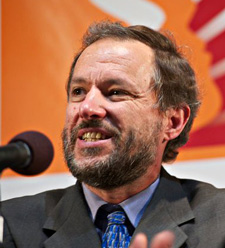Archive for the ‘Ukraine’ Category
Cuba – and then what?
By Johan Galtung
The immediate reaction to Obama’s Executive Order of 17 December 2014 – re-establishing diplomatic relations, easing travel, swapping prisoners – was a sense of relief: finally correcting a more than 50-year old stupidity. But why now? Later. First, back to June 1960.
We drove from New York to Key West, then a ferry – the captain was Norwegian – to La Habana; we wanted to drive all over, talk with everybody to understand. And the social picture was very clear: black, woman, low class overwhelmingly in favor of the revolution; white, man, middle-upper class ended up in Miami. Why gender? US imperialism was obvious but in addition Cuba was one big brothel for “puritan” US men. And one of the first acts of the revolution was to stop that, liberate the dirt poor girls, organize vocational training – give them dignity. Read the rest of this entry »
TFF PressInfo # 292: Brisbane – A show of Western weakness
By Jan Oberg
No matter what you may think of Putin and Russia this is simply not the way international politics should be conducted, particularly not at the personal level. If it wasn’t an offence to children, one would aptly characterise it as childish behaviour.
Western leaders ignored a brilliant opportunity to meet face-to-face with Vladimir Putin and move forward towards mutual understanding instead of signalling that they want a new Cold War.
Western leaders tell us that Russia is a ”threat to the world”. That obviously serves other purposes because you don’t bully someone you genuinely fear.
The G20 Brisbane should be remembered for its show of Western leaders’ personal display of weakness and conflict illiteracy.
Pummelled Putin punching bag
CNN reports that, during the meeting, Putin took ”pummelling” and was treated as a ”punching bag” by Western leaders from he set foot on Australian soil where his Australian host had sent a deputy minister of defence to receive him.
The Guardian reports that the Russian president approached Canadian Prime Minister Harper with his hand outstretched. Harper reluctantly shook it, then said “Well I guess I’ll shake your hand, but I only have one thing to say to you: you need to get out of Ukraine.” ”Bold words” – media called it.
Footage shows Putin sitting alone at a lunch table – like a naughty school boy put in the corner as by his teachers.
President Obama said that we are ”opposing Russia’s aggression in Ukraine which is a threat to the world as we saw in the appalling shoot down in the MH-17”. Read the rest of this entry »
Is Russia on the warpath?
By Jonathan Power
Just before former Soviet president Mikhail Gorbachev on Saturday made his stunning criticism of the West that, since the fall of the Berlin Wall, it had engaged in “triumphalism”, I was in Moscow. Everyone I talked to said the West had set out to humiliate Russia (not to help rebuild it as it did in Germany after the Second World War).
Gorbachev has long been the West’s pet political darling, (although the New York Times didn’t report this speech) – for undoing the straitjacket that enveloped Soviet society, for allowing the reunification of Germany and for being the major contributor to ending the Cold War.
So the question is will the West listen to him now? Will it listen to his point that the expansion of NATO has made Russia feel threatened?
Will it understand that there is a good reason why he and an overwhelming majority of Russians support President Vladimir Putin’s foreign policy? Will it share his fear that “we are on the brink of a new Cold War”?
One of the people I talked to Read the rest of this entry »
TFF PressInfo 291: Coping With the Loss of a Close Enemy
Perestroika as a Challenge to the West
By Jan Oberg
Written April 1990
Published in Bulletin of Peace Proposals 3-1990, pp 287-298 and on TFF’s homepage at the same time
1. Four hypotheses
The West has lost a close enemy, the Soviet Union and Eastern Europe. Which reactions can be discerned and what psycho-political emotions are they indicative of? How did the West cope with the first years of this new post-Cold War situation? Can we mourn the death of an enemy, can we heal ourselves after the loss? How does one learn to live a new life without a close enemy? Has the West done what it ought to do for itself and for the former enemy?
“The West” of course is a term hanging loose. We employ it in this article as meaning interchangeably “NATO, the Western hemisphere, the United States and Western Europe and a few cases, Western or Occidental culture”.
The first hypothesis of this essay is that the West, i.e. the Western part of the Occidental civilization, is traumatized by the loss of its Eastern brother.
The second is that we have discussed far too little what it means for the West and projected all our attention on the Soviet Union, i.e. acted as spectators in a certain sense.
The third hypothesis, therefore, is that the West is increasingly stuck in a self-congratulatory “we have won the cold war and socialism is dead” attitude which only increases the likelihood that it will be taken even more by surprise in the future.
And the fourth hypothesis is that the changes in the Eastern Occidental brother occur simultaneously with a number of challenges within the Western Occidental system and is bound, ultimately, to pose an overwhelming challenge to our own system. There is now an historical opportunity, a new political space and time to be filled by cooperation and exciting visions of a common future. We believe that the West has something to learn from the idea, not the content, of perestroika, i.e. experimenting with deep non-violent change in one’s own system the outcome of which cannot be known with any precision.
Czech playwright and president, Václav Havel, when in January 1990 adressing the Polish sejmen, argued that Eastern Europe should not be seen as a poor dissident or a bewildered prisoner set free but “as someone who has something to offer, namely spiritual and moral inspiration, daring peace initiatives, an unexploited creative potential, an ethos of new freedom and impulses toward bold and quick-moving solutions.” And he rounded off this speech with the following words (author’s translation again): “The most dangerous enemy today is not the dark forces of totalitarianism, intriguers or leagues of gangsters – it is our own dark sides. My program as president is therefore based on the principle of infusing spirituality, moral responsibility, humanity and humility into politics and, thus, insist on there being something higher than we humans, that our deeds shall not disappear into the dark holes of our time but be preserved, somewhere, investigated, evaluated – that we have neither a right nor a reason to maintain that we understand everything or can do everything.”
One may wonder with whom in the West Havel can have a dialogue at this level? Who in the West would respond in these existential and visionary terms? Why is the response of the West first of all Read the rest of this entry »
TFF PressInfo # 288 – Where it all went wrong and lessons were never learnt
By Jan Oberg
On November 9, it is 25 years the Berlin Wall came down. Seventeen months later, Yugoslavia’s dissolution began and various concepts and policies were introduced that fundamentally changed international politics ever since – more so than the fall of the Wall.
These features can be seen in the conflict (mis)management in later conflicts.
By now we should have accumulated enough evidence of how effective the various ”teatments” of the ”patient” called Yugoslavia were. To put it crudely: A unique country was destroyed – yes from the inside too, but that doesn’t reduce the responsibility of the West/NATO in its role as ”peacemaker”.
Today, Croatia is ethnically much more clean; Kosovo remains a failed state; the constituencies of the Dayton Accords for Bosnia (1995) still won’t live together as one state, as elections have just shown us. Macedonia’s problems have only deepened. The split between Serbia and Montenegro was enigmatic. Today’s Slovenia is the only unit that can be said to be in a better situation now than when part of Yugoslavia.
It is high time we get a critical discussion going of what the international so-called community chose to actually do – no matter the stated intentions – to help bring about peace in former Yugoslavia.
All of it must be re-assessed and lessons must be learned for governments to introduce a little modesty and recognise that they are not born peacemakers but rather war makers. And we need such a debate to go down another road than the one we took since 1999.
TFF maintains that the crisis in and around Yugoslavia is much more significant for international affairs than hitherto assumed because e.g.:
• The international so-called community’s attempt at being self-appointed conflict analysers and peacemakers with no prior education or training right after being Cold War warriors led to miserable results on the ground.
• Closely related: the amateurish idea that conflicts could be understood and treated as two parties, one good and one bad. The bad guys were the Serbs, of course, and Slobodan Milosevic became the new ”Hitler of Europe” after the West had used him as an ally.
• During this crisis Russia was sidetracked and humiliated. But in the Soviet Union era no one would have dared touch the Yugoslav space. Now the West could do what it wanted and Russia could do nothing to oppose it.
• Violent humanitarian intervention was introduced and persuaded many, Read the rest of this entry »
TFF PressInfo 285: Vilken ubåt i Sverige?
Av Jan Öberg
Två dagar efter detta skrevs stoppades sökningen – som förutsagt i konklusionen nedan.
Ni har hört att Sverige jagar en “ubåt” och att den “antas vara rysk”. Exempelvis skriver Financial Times om detta den 21 oktober – och meddelar också att den svenska statsministern lovar att öka försvarsutgifterna. Det finns bara tre problem med detta:
1) Det finns inte det minsta bevis för att där finns något militärt att hitta, inte heller att det är ryskt. Read the rest of this entry »
TFF PressInfo # 285: What submarine in Sweden?
By Jan Oberg
You have heard that Sweden is hunting a ”submarine” and that it is ”presumed to be Russian”. Here is an example, Financial Times of October 21 – which incidentally also announces that the Swedish Prime Minister vows to increase defence spending.
Not the slightest evidence
There are only three problems with this:
1) There is not the slightest evidence of there being anything military, neither that it is a submarine nor that, whatever the object might be, it is Russian.
2) Even with CNN, BBC and AlJazeera this is nothing but speculative low-grade yellow press journalism. This is possible in the field of defence, security and peace because much less is required of journalists when they write about these matters than when they write about, say, domestic politics, economics, sports, books or food and wine. In these fields you are expected to have some knowledge and media consumers are able to check. Read the rest of this entry »
End Game in Ukraine?
By Jens Jorgen Nielsen
Written September 25, 2014
It should never have come to this horrible situation in Ukraine. The local population of Donetsk, Lugansk, Slavyansk and other eastern Ukrainian cities is living through a true nightmare. Residential areas are being bombed, shelled and burned. Non-combatants i.e. elder, women and children are lying dead in the streets. We’re talking about thousands of deaths. No water supply, no heating, no security – this is the grim reality for the population.
700.000 Eastern Ukrainians have already escaped from the war scene, most of them are living in refugee camps in Russia. It is worth noting that they have not fled to Kiev or elsewhere to the west.
Surprisingly the Western media hardly pay any attention to the horrors in Eastern Ukraine.
But that is not all. Ukraine is in total disruption socially, politically and not least economically and financially. Furthermore, the mental scars in Ukraine will continue for at least one generation ahead.
But again that is not all. The European Union suffers as well – in several ways. Read the rest of this entry »
Ukraine and nuclear weapons – Scrap all nuclear weapons
By Gunnar Westberg
”Ukraine is going to make nuclear weapons. You’ll see. There is strong support in the parliament. All the intercontinental missiles in the Soviet Union were made in Ukraine, and there are at least 25 of them left. And we have uranium. And we have the know-how. Just wait, you’ll see!”
So said an officer in the Ukrainian army whom I met about a month ago. This prediction, that Ukraine is going to make nukes, can also be found in some Western news media.
Fortunately, this is not going to happen.
There is no uranium of weapons grade in the country. To produce a sufficient amount of high grade uranium thousands of centrifuges for enrichment are needed. Only Pakistan could sell them, as was done to Iran, but both the USA and Russia will stop this trade. Ukraine could Read the rest of this entry »
U.S. leadership against Russia crippled by its own hypocrisy
By Stephen Zunes
Washington’s major limitation towards Russia is not a lack of military leadership, but a lack of moral leadership
The fragile ceasefire between the U.S.-backed Ukrainian government and Russian-backed rebels could help pave the way to a peaceful resolution to the conflict—or simply postpone a worsening of the crisis. Unfortunately, Washington’s leadership of international efforts against Russian aggression has been severely compromised by its own hypocrisy and double standards.
As with Russia in eastern Ukraine, the United States has a long history of arming, training, and even providing personnel in support of rebel groups in such countries as… Continue reading here.






